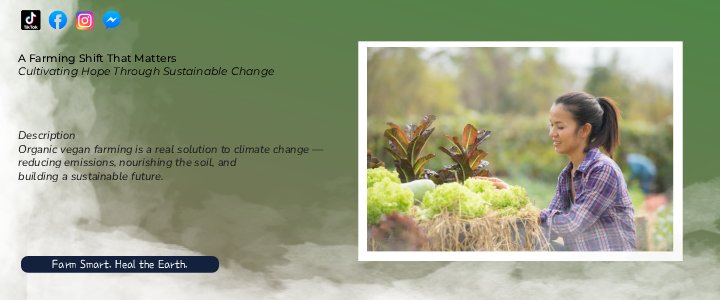Farming & the Climate Crisis
In the battle against climate change, the way we farm plays a critical role. Conventional agriculture contributes large volumes of greenhouse gases, degrades soil, and often depends heavily on animal-based inputs. Shifting toward vegan-organic farming offers a promising path to minimize carbon emissions, restore soils, and foster more resilient ecosystems. In this article, we’ll explore how this plant-based, animal-free form of organic agriculture can contribute to climate solutions—and why it deserves serious attention.
What Is Vegan-Organic Farming?
Vegan-organic (or “veganic”) farming is similar to organic agriculture but takes it a step further by eliminating all animal-based inputs—such as manure, bone meal, blood meal, fish emulsion, or animal-derived fertilizers. Instead, vegan-organic systems rely on plant-based compost, green manures, cover crops, and mineral amendments.
By removing animals from the input chain, vegan-organic farming reduces reliance on livestock systems—systems that are often high in emissions and resource inefficiencies.
How Vegan-Organic Farming Impacts the Climate
Switching to vegan-organic practices offers benefits across multiple dimensions. Below is a list of climate-relevant impacts:
Here are crucial ways vegan-organic farming matters in the context of the climate crisis:
- Lower Greenhouse Gas Emissions
Livestock farming accounts for methane (a potent greenhouse gas) and nitrous oxide from manure. By avoiding animal inputs, vegan-organic farms reduce associated emissions. - Reduced Carbon Footprint through Input Efficiency
Animal agriculture is inefficient: animals consume plant matter (feed), and converting that into meat or dairy incurs large energy and resource losses. Directly growing plants for food or fertilizer is more efficient in terms of carbon per unit yield. - Soil Carbon Sequestration & Regeneration
Practices such as cover cropping, mulching, minimal tillage, and organic matter return help build soil organic carbon. Over time, soils can become carbon sinks. - Reduced Pollution & Nutrient Runoff
Animal manures and synthetic fertilizers often lead to nutrient leaching, water pollution, and greenhouse gas emissions from denitrification. Plant-based composts break down more slowly and tend to reduce nutrient runoff. - Support for Biodiversity & Ecosystem Resilience
Vegan-organic systems encourage habitat conservation, diversity of crops, and beneficial insects, which altogether build more resilient ecosystems under climate stress.
These impacts cumulatively show that vegan-organic farming can be a piece of the climate solution—not a silver bullet, but a valuable tool in the toolbox.
Challenges & Considerations
Vegan-organic farming is not without its hurdles:
- Labor Intensity & Complexity: Organic, plant-based fertility systems often require more labor and careful planning than industrial methods.
- Transition Yields & Economics: Moving away from animal inputs may initially reduce yields or raise costs until the system stabilizes.
- Mineral & Nutrient Management: Ensuring balanced essential nutrients (e.g. calcium, potassium, trace minerals) without animal byproducts can be more challenging.
- Certification & Scale: Vegan-organic farming is still niche. Few certification systems exist, and scaling up these practices requires more research, policy support, and market demand.
Still, early adopters and experimental farms (e.g., under the Biocyclic Vegan standard) are making strides in demonstrating its viability.
Comparing Farming Systems: Vegan-Organic vs Conventional
Here’s a rough comparison table to illustrate differences in climate and sustainability metrics:
| Aspect | Conventional / Animal-Based Agriculture | Vegan-Organic Farming |
|---|---|---|
| Greenhouse Gas Emissions | High (methane, N₂O from manure & inputs) | Lower (no animal inputs, more efficient plant conversion) |
| Soil Health / Carbon Sequestration | Often degrades soil, limited carbon storage | Builds organic matter, potential soil carbon sink |
| Nutrient Runoff / Pollution | High risk from manure and synthetic fertilizer | Reduced runoff with plant-based compost & careful management |
| Biodiversity & Ecosystem Support | Often monocultures, habitat loss | Supports diversity, pollinators, integrated systems |
This table highlights how vegan-organic methods stack up favorably when climate and sustainability are primary goals.
Conclusion
Farming is one of humanity’s greatest levers in shaping the climate future. While vegan-organic farming is not a one-size solution, it brings a more efficient and ethical pathway—cutting emissions, fostering soil health, and reducing pollution.
As climate pressures grow, combining innovations such as vegan-organic methods, regenerative practices, and smart policy incentives can lead us toward a more sustainable food system. The shift won’t be easy, but the potential rewards—for soil, biodiversity, and the planet—make it worth pursuing.



